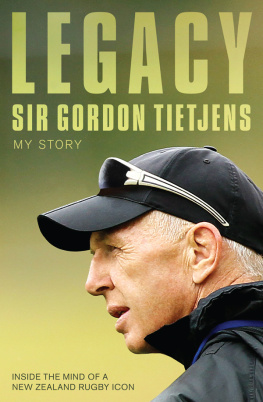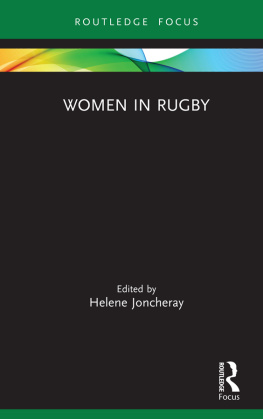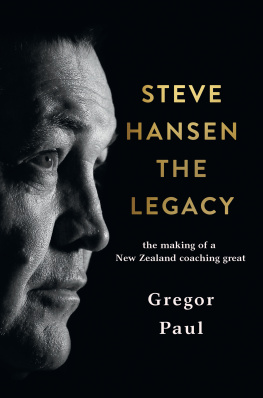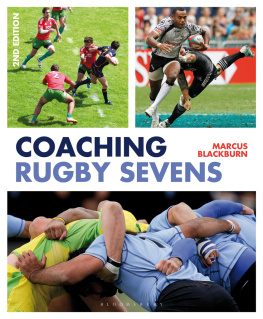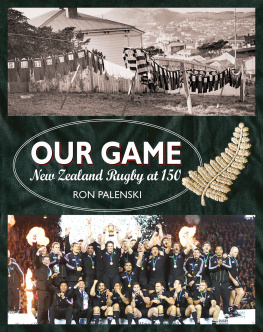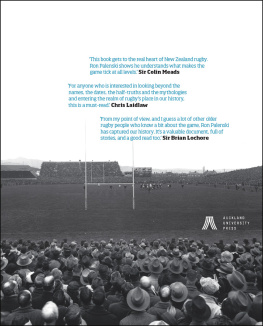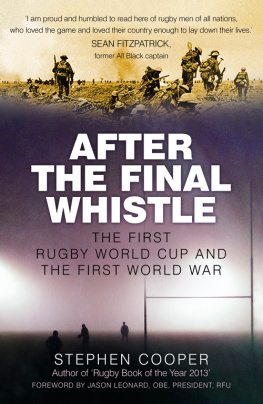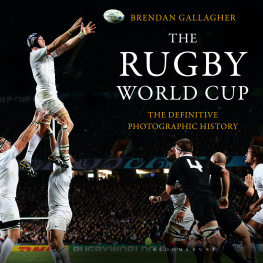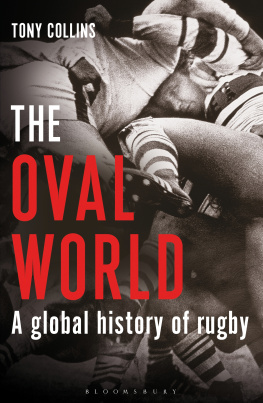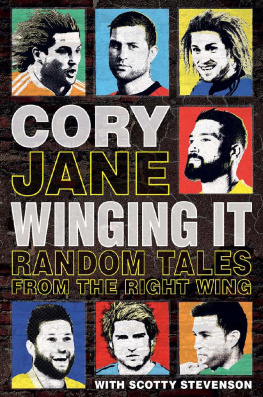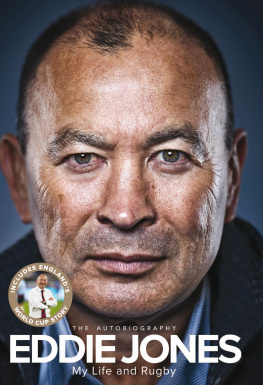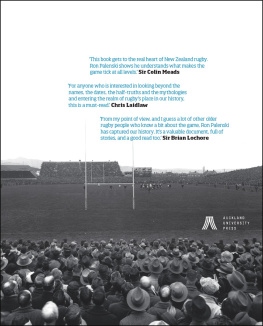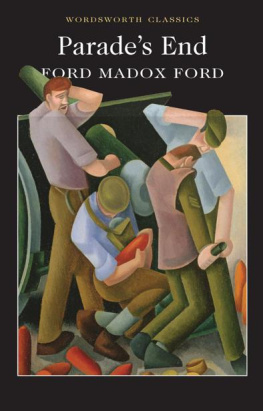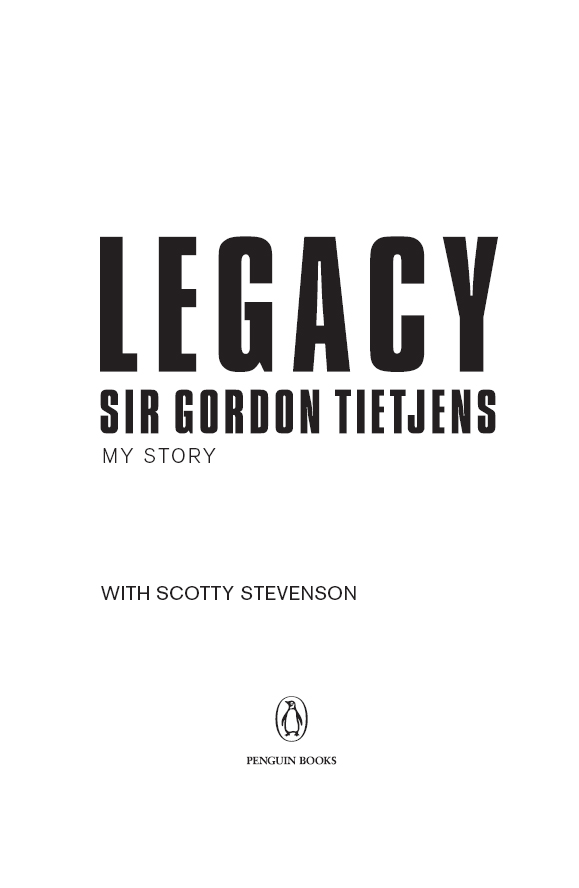In 2012, Sir Gordon became the first sevens coach to be inducted into the IRB (now World Rugby) Hall of Fame and, in 2013, was knighted for services to the game.
After a remarkable 22 seasons, Sir Gordon stepped down as head coach of the New Zealand sevens team in 2016, following its early exit from the Olympic Games in Rio de Janeiro. He is now coach of the Samoan sevens team.
Sir Gordon is the father of Paul and Kylie and lives in Tauranga with his wife Jules.
PROLOGUE
NOT LIKE THIS
WERE NOT THE fucken All Blacks! Thats what I said when I had finally had enough. Then, in an air-conditioned room overlooking a pristine sporting complex on a perfect Florida winters day, I completely broke down. I had never felt so low in 22 years of coaching sevens, and I was a week out from the biggest event of my life, the 2016 Olympic Games in Rio. For over two decades I had trained players to face life on the breaking point. I had finally found my own line, and taken a step over the edge.
It should have been the greatest experience of my sporting career, and perhaps there was a chance it could still be, but the 18 months leading up to this awkward and confronting meeting in some nondescript office in the middle of the IMG Academy complex in Bradenton had been the most challenging I had ever known. Everything I thought I knew about my ability as a coach, and a manager of people, had come in for questioning. In the time of my greatest need, I had felt deserted. I was now trying to figure out if I still had the support of the very team I was the coach of. It certainly didnt feel that way.
As soon as I had heard that sevens had been included as an Olympic sport I had wanted to be a part of it. In 2009, when the decision had been made, I had already been coach of the New Zealand team for 16 seasons. If I wanted to be in Rio, I still had another six to go. I never once thought that would be a bridge too far. From the moment I had seen my old mate Jonah Lomu celebrating sevens successful campaign for inclusion, I had my heart set on the chance to coach a team to a gold medal. Now here we were, and we were nowhere near where we needed to be.
I was in the room with Don Tricker, the head of New Zealand Rugbys High Performance team. That morning my side had played a warm-up match against the USA and had been embarrassed. There had been no effort, no precision, no personal standards at all. I had been so devastated to watch them, and was furious with them after the game had finished.
It wasnt that we had lost what was ostensibly a training game, it was the general vibe within the team that had me angry and perplexed. It could have generously very generously been described as lacklustre. I couldnt understand why they were so lacking in fizz and pop when the greatest opportunity of their lives was mere days away.
I had spent many months carefully knitting together a plan to win gold and over the last 18 months it felt as if every meticulously crafted stitch had been systematically unpicked. What I had desperately needed from Don and his team was the one thing every coach needs to succeed: playing resources, especially with our escalating injury count. As far as I was concerned, what I had received instead was countless enquiries, and advice that never seemed to match up with what had worked for us for so many seasons. We may have had a name change to share a brand with the All Blacks, but we were the New Zealand Sevens team a team so fundamentally distinct in size, shape and approach from the national fifteens side that it required a very different way of doing things.
I had honed that approach over 22 years in the job. It was one based on two very simple concepts: culture and conditioning. Everything else leadership, performance, harmony, respect, pride flowed out of those two foundation principles. I was tired of hearing what the All Blacks did. As much as I respected that team enormously for its success, it was not the only team in the world that had developed a winning formula. The push to apply their principles across every facet of New Zealand rugby, I believed, was not the magic bullet it was made out to be. Even more ironically, it was, even in this Olympic year, a team that still took precedence over our quest for gold. That had been the cruellest cut of all.
Don was trying to help, I knew that. But when I heard those words again What the All Blacks do is I completely lost it. I had never experienced anything like that next few minutes. It was as if someone had sucked all the oxygen from the room and replaced it with a suffocating feeling of helplessness. How had I come to this point? Why did I feel so alone when I had for years considered this team and this game to be my extended family?
I needed to address the players, that much was clear. Shaking off my dismay, I took a deep breath and resolved to find the positives in the pain. The gold medal was still there and it was still up for grabs. If I could just get this ship on the right course there was hope for us yet.
For 22 years I had coached this team based on a simple philosophy that now, more than ever, I had to keep trusting in. It was a philosophy that had been forged from an early age, refined through a successful business career and the pursuit of sporting excellence, and rolled out season after season on some of the finest players ever to take the field. I had learned so much from my players over the years and I had always tried to be positive. Sevens is a sport that does not allow you to dwell on your mistakes or your problems and I wasnt going to do that now. I knew I could still teach them something, too. If they were still willing to listen.
Yes, I wanted them to win a gold medal, but there was no denying I wanted to be able to say I helped them get there. It would top everything else I had achieved as a coach, of that I was certain. Maybe thats why it meant so much to me it would be the perfect way to finish a coaching career that had developed almost by accident, one which had taken me from a tiny house in Rotorua and was about to deposit me in the very heart of the worlds biggest sporting event.

